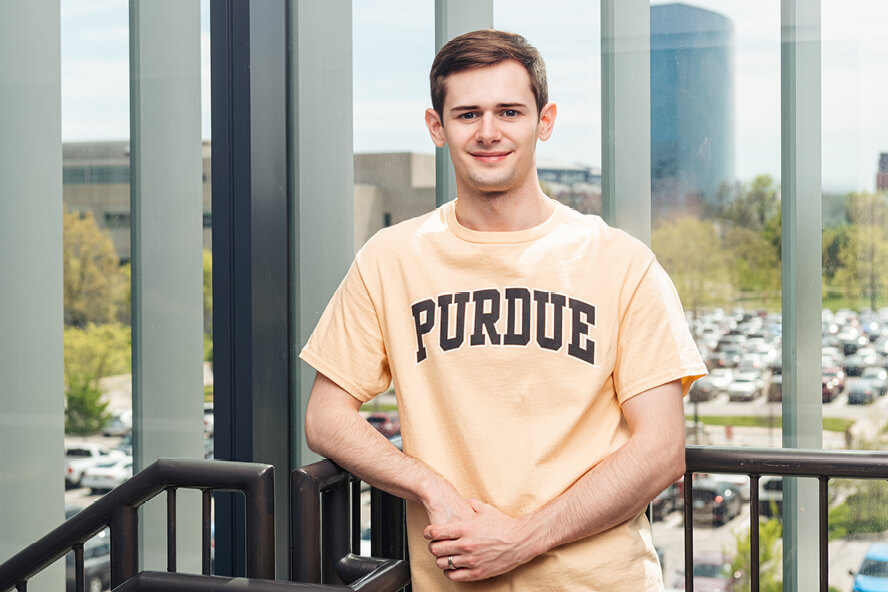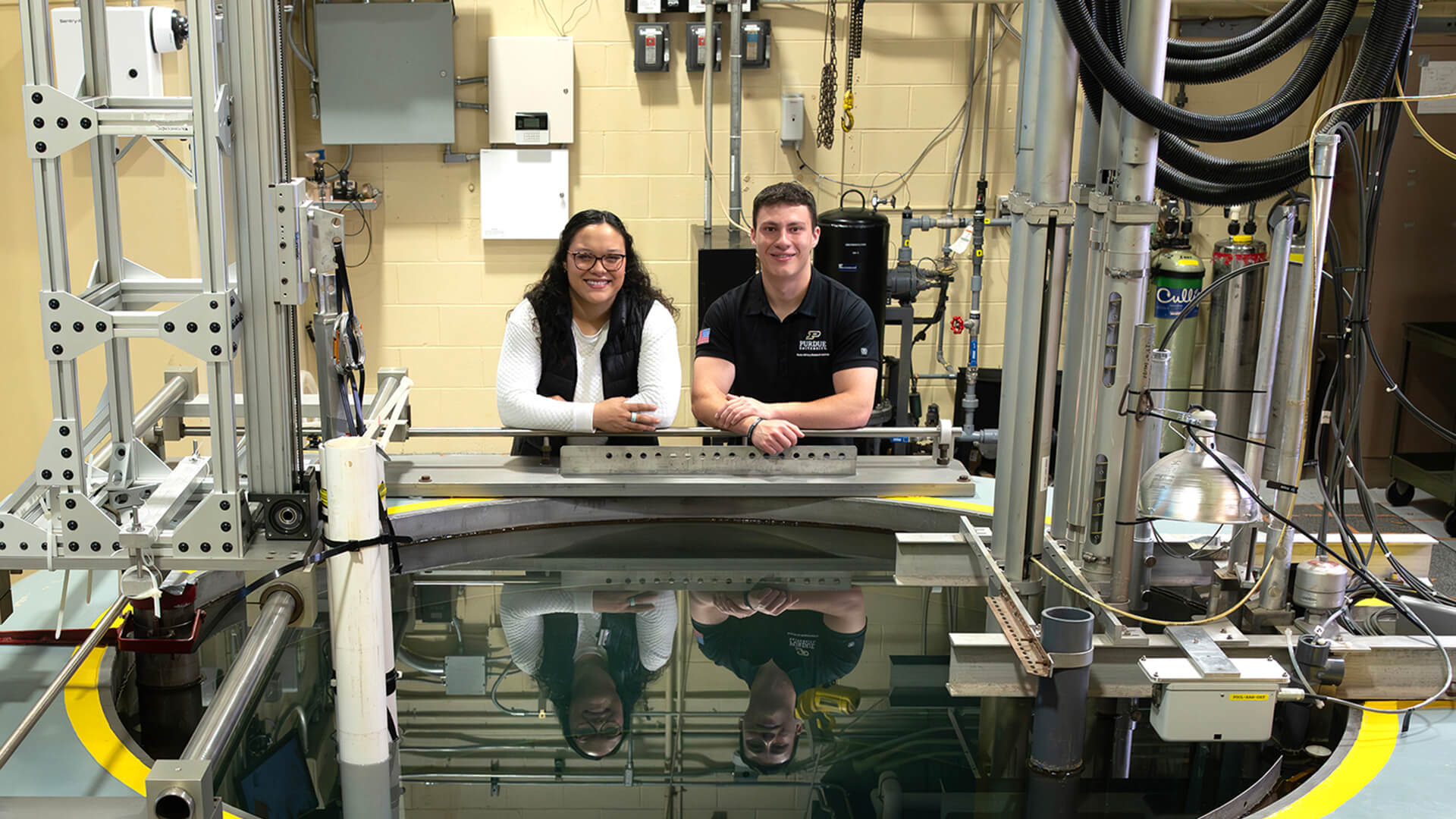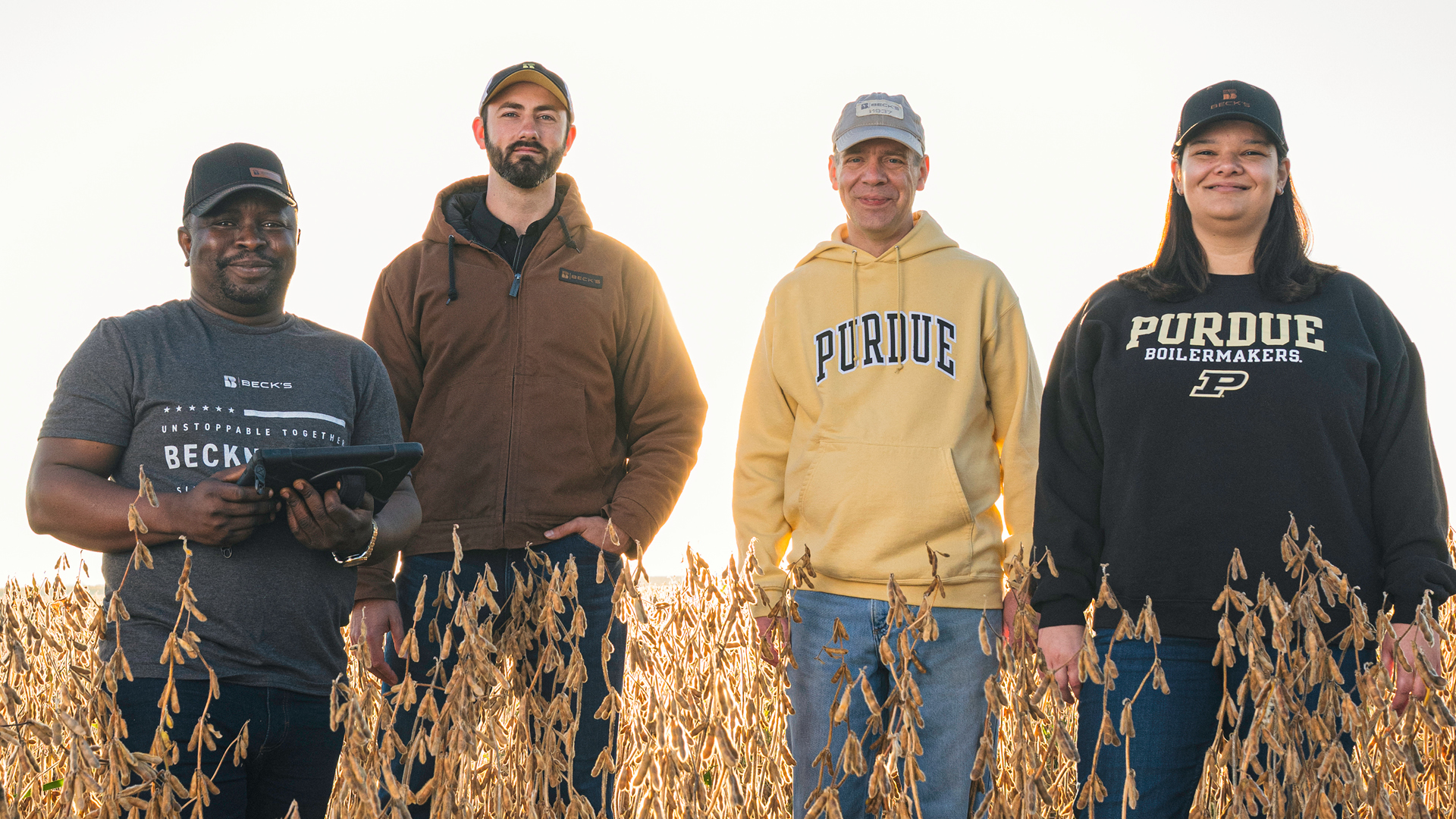Cybersecurity student’s persistence leads to exceptional opportunities
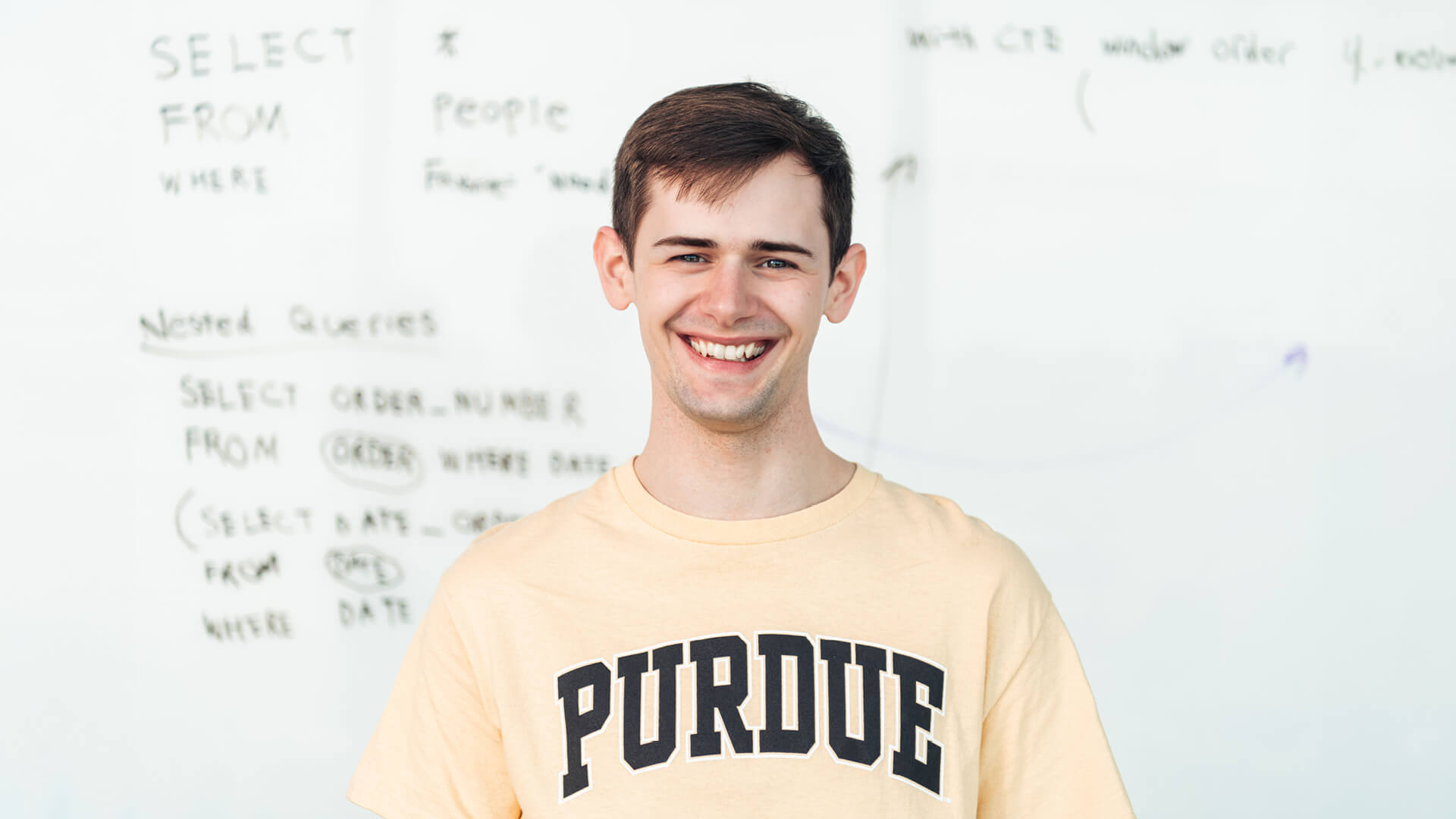
Noah Pumphrey, Purdue cybersecurity student in Indianapolis
Noah Pumphrey is building his career on a foundation of hands-on learning and practical experiences
Noah Pumphrey, a Purdue cybersecurity student in Indianapolis, has taken a disciplined approach to his education. The result has been a nationally competitive scholarship, a leadership role in cybersecurity and professional certifications before he even graduates.
“I enrolled at another university right after high school,” Pumphrey says. “But after taking a variety of classes, I still wasn’t quite sure what I wanted to do in the future.”
Pumphrey pressed pause on his college education and took time off to gain experience. He spent the next four years working full time in the finance industry, which helped him discern his vocation and save money for college.
“Before transferring to Purdue, I wanted to be really certain of the career I wanted to pursue,” he explains.
And it became clear to him that cybersecurity was his path.
A national reputation for excellence
When Pumphrey was ready to return to college, Purdue in Indianapolis was an easy choice because of the university’s national reputation in cybersecurity.
“Cybersecurity at Purdue is just different,” Pumphrey says. “It’s the best in the country. I look at my experience and see that they prepare us so well here. You gain fundamental skills that you can actually put to work.”
The flexibility of the Purdue in Indianapolis program was another important factor in his decision, as he continued to work while taking classes full time.
He appreciates that the program’s small class sizes have enabled him to form connections with his professors, many of whom are world-class cybersecurity experts. “The professors at Purdue in Indianapolis work hard to set us up for success,” he says.
Cybersecurity at Purdue is just different. It’s the best in the country. I look at my experience and see that they prepare us so well here.
Noah Pumphrey
Purdue cybersecurity student in Indianapolis
National Science Foundation
Close relationships with professors have also led to incredible opportunities outside of the classroom for Pumphrey, including a National Science Foundation CyberCorps Scholarship for Service (SFS).
“It’s a full-ride scholarship for those interested in doing cybersecurity for the federal government after graduation,” Pumphrey explains. “And that’s exactly what I want to do.”
SFS is highly competitive: Only 12 to 16 awards are given out nationally each year. The program provides funds for student scholarships to institutions of higher education, not to students directly. To participate in the program, Purdue in Indianapolis had to provide clearly documented evidence of a strong existing program in cybersecurity.
“I think it speaks volumes to the kind of faculty we have and the work that we are able to do with them on campus,” Pumphrey says.
Feng Li, chair of the Department of Computer Information and Graphics Technology, is the primary investigator for the CyberCorps program at Purdue in Indianapolis, and a person with whom Pumphrey works closely.
“Dr. Li secured funds from the NSF,” Pumphrey says. “And he’s the one responsible for hiring and making sure CyberCorps students are doing what we need to do to get to our full-time and internship positions.”
The award has made a tremendous difference for Pumphrey, both financially and academically.
“Since receiving the scholarship, I no longer need outside employment,” he says. “All my time can now be focused on research, academics and certifications.”
It’s just priceless to be able to put real coding projects on a resume, to tell hiring managers that you have hands-on experience. … You can actually show how you have applied what you’ve learned.
Noah Pumphrey
Purdue cybersecurity student in Indianapolis
Hands-on learning, resume building
Pumphrey starts his academic week with a two-hour Offensive Security class, which teaches him how to use hacking tools. Programming classes in languages including C and MATLAB occupy the bulk of the rest of his schedule.
“The programming classes are more like engineering classes,” he explains, “but they are also applicable to cybersecurity.”
The practical nature of what he is learning in class appeals to Pumphrey. He especially appreciates that he is establishing a solid foundation for his future career.
“I am gaining the fundamental knowledge I need,” he says. “I get to do hands-on things with programming and hacking in the 400-level, and even 300-level, classes that I will be actually doing on the job.”
As an example, last semester in his Cybersecurity Programming class, Pumphrey used Python to write a program that analyzed a firewall log. A firewall monitors traffic into and out of the environment it was developed to protect; logs provide organizations with information to help investigate after an attack.
The program Pumphrey wrote parsed a large firewall log. “It would take hours or days for a person to go through that log,” he explains, “whereas I am making it easy to sort through within minutes.”
Pumphrey put the firewall log program on his GitHub, which was a huge resume builder for him. When he was talking to the federal government about his work, he was able to point them to code he had already written that aligned with projects they are working on.
“It’s just priceless to be able to put real coding projects on a resume,” Pumphrey says, “to tell hiring managers that you have hands-on experience. You’re not just somebody who has theoretical knowledge stocked up. You can actually show how you have applied what you’ve learned.”

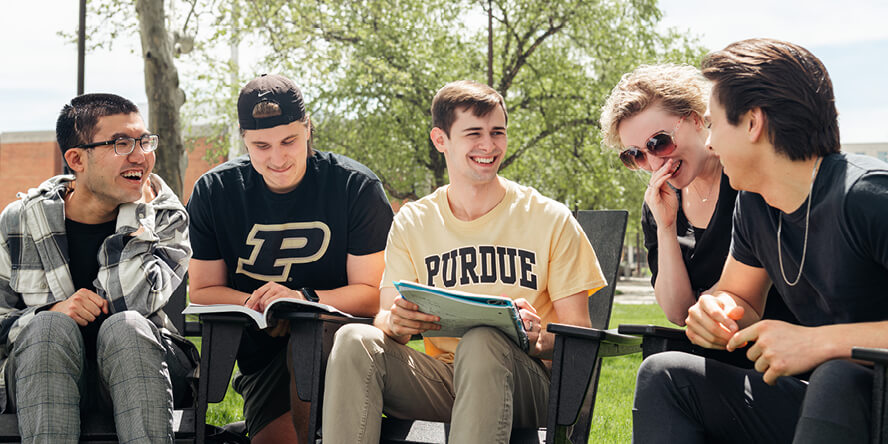


Cybersecurity club
The resume building Pumphrey has experienced isn’t limited to the classroom. Cybersecurity students at Purdue in Indianapolis are elevating their knowledge through participation in the cybersecurity club.
“We have students who really want to go into hacking website applications,” he explains. “There’s not necessarily a specific course for that. Professors will prepare you to do those things, but cybersecurity club is where you will really be able to shine with those skills.”
Pumphrey is the undergraduate student government senator for the cybersecurity club. The role has opened his eyes to what other clubs and organizations on campus are doing, and helps him see ways in which he can support and promote his own club.
With many of the cybersecurity club’s officers graduating soon, Pumphrey will be stepping into more of a leadership role. “I’m doing presentations for prospective students or current students that may not know about the club,” he says. “We’re really trying to ramp up our efforts.”
The club hopes to expand by attending conventions and bringing speakers to campus to talk to students about career opportunities.
“I am also excited for us to be involved in hands-on cybersecurity activities like Capture the Flag competitions, which are on the attack side, and the National Collegiate Cyber Defense Competition, which is a regional and nationwide competition for the defense side,” he says.
Pumphrey also is interested in forming connections between cybersecurity clubs on Purdue’s West Lafayette and Indianapolis campuses. “It’s going be an interesting leap for our club,” he says. “I think it’s going to be mutually beneficial. Working together, we can bridge the work we do in our studies and the work we will do in our careers; that is what I’m trying to accomplish with the cybersecurity club.”

Practical advantages
In addition to strong academics and extracurricular activities, Pumphrey appreciates the helpful career preparation he has found at Purdue in Indianapolis, especially when it comes to interview skills. He has taken advantage of numerous practice opportunities on campus.
Another key support has been in resume creation. “Applying for work in the federal government is different,” he explains. “You have to use a federal resume, which can be pages long. Many people, including advisors and staff, have looked over my resume and offered me helpful advice and a second set of eyes.”
Research alongside world-class cybersecurity experts has been another advantage for Pumphrey. “I am interested in purple teaming,” he says, “which explores both the attack side (red team) and the defense side (blue team) of cybersecurity.”
Pumphrey wants to focus on cyber threat intelligence, specifically in a national security setting, which can be hard to do as a college student because the work requires security clearances. Partnering with professors like Li, he is able to gain the knowledge and skills he will need to find threats within a system.
He also points to the certifications he is earning as a student as a key differentiator. “I have my security-plus certification,” he says. “And I will be working toward the Certified Information Systems Security Professional credential, which is a highly regarded certificate in the cybersecurity domain.”
Close relationships
Through classes and the club, Pumphrey has made good friends. And they like to meet at the student center on campus. “Sometimes we’ll just hang out and talk. Sometimes we do homework because we are in a lot of classes together,” he says. “We help each other along the way with the labs and talk about cybersecurity, internships, all the things we’re doing.”
Pumphrey also has a close relationship with his academic advisor, Kelly Keelan. “I talk to her probably once a week,” he says. “Sometimes I’ll sit in her office for hours and just talk about anything, whether it’s a class, the club or my career.”
It’s the little things like this that set cybersecurity at Purdue in Indianapolis apart. “The program here is preparing me well for my future,” Pumphrey says.
